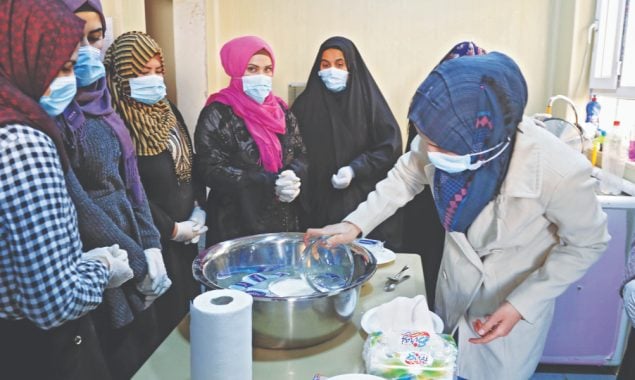
BAGHDAD – Learning to make yogurt, butter and cream gives 32-year-old Zainab Hazem and her Iraqi counterparts new hope they can support their families in the war-torn town of Al-Hamdaniya in Iraq’s Nineveh province.
Zainab had fled her village in the Nimrud area in 2014, escaping only two hours before the Daesh group took control.
Zainab and her family survived the conflicts, but they lost livestock and money. When they returned home in 2018, they needed to begin from scratch.
Although millions of Iraqi displaced families have returned to their destroyed homes, they are struggling to gain a sustainable income and make a living upon the ruins. How could the displaced restart their lives?
The question raised major concerns. Answers seemed especially difficult after a refugee crisis worsened along the Belarus border at the end of 2021.
Most of the refugees came from Iraq and Syria.
Zainab and many local women joined a training programme, which was funded by the UN World Food Programme (WFP) and a nongovernmental organisation.
They can choose training to make dairy products, process food, hatch eggs, or develop their own businesses.
Many of the trainees are widows. Some are taking care of their families alone because their husbands went missing during the battle against Daesh.
The women faced the harsh reality of life after returning home from years of displacement. They had to start from nothing to rebuild their lives.
“I hope that we start a business and develop it to gain an income. We do not have any other income,” Zainab said during a training session to make yogurt. “Most of us women are widows, and we do not have a breadwinner.”
Creating training and skills development opportunities for the women affected by conflicts is important, spokesperson of the WFP in Iraq Sharon Rapose told Xinhua.
“What they need now are sustainable incomes, so jobs are not just for today or tomorrow,” Rapose noted. “By creating small businesses that the women run, they are empowered to lead.”
Rahma Mahmoud Rajab chose to train on a poultry hatching project to provide a living for her family. She lives in a village east of Mosul, and her house is partially destroyed.
“I want to work on the chick hatching project because there is no other such project in our village. I hope to succeed,” the mother of three children said.
Holi Ghanem is a pioneer among these women. After finishing her training course several months ago, she opened a small bakery in an abandoned garage in Al-Salamiyah area, some 25 km south of Mosul.
Her neighbourhood lacks rebuilding infrastructure and public services.
She relied on a gas-fuelled oven to make sesame bread for residents. Nine women joined her business to make pastries, cakes, and sweets.
Hoping to make a difference, they named the bakery “Hope Team.”
“We started making a profit. Now we feel that we have our own income. Even if it is small, it gives us a sense of stability and a way to rely on ourselves,” Holi said.
Read More News On
Catch all the International News, Breaking News Event and Latest News Updates on The BOL News
Download The BOL News App to get the Daily News Update & Follow us on Google News.




